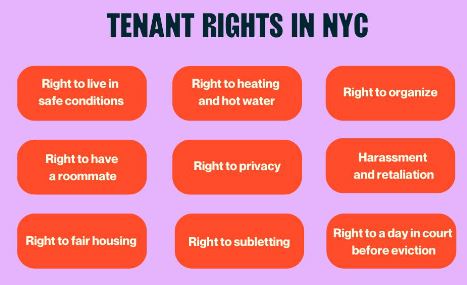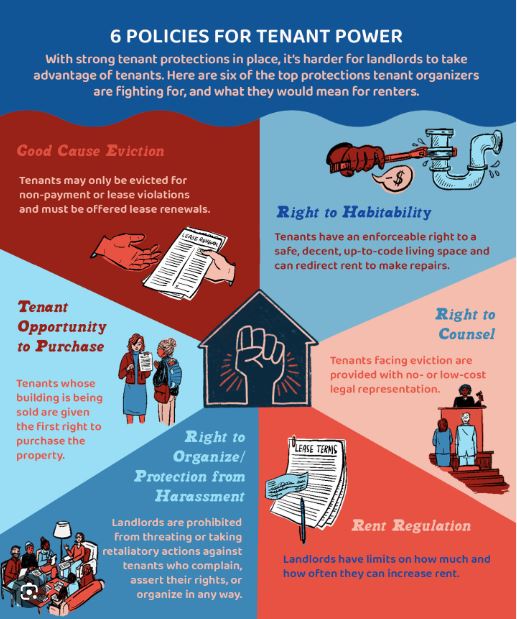“Good day everyone! Have you ever heard about people who live in homes but don’t own them? They’re called tenants! Just like you have rules to follow at school and at home, tenants have rules they need to know about too. These rules are called tenant rights!
Tenant rights are like a list of promises that landlords make to the people who live in their homes. They’re like the rules of a game that everyone has to play by. Here are some tenant rights that are super important:
- Safe Home: Tenants have the right to live in a home that’s safe and healthy. This means the landlord has to make sure things like the roof, walls, and doors are in good shape and keep the home free from things that could make people sick.
- Privacy: Tenants have the right to privacy in their home. This means the landlord can’t just come in whenever they want without asking first. Your home is like your own special clubhouse!
- Fair Treatment: Tenants should be treated fairly and with respect. Landlords can’t say mean things or do things that make tenants feel bad.
- Repairs: If something in the home breaks, like a leaky faucet or a broken window, the landlord has to fix it. Just like how your parents would fix things in your home if they were broken.
- No Discrimination: Landlords can’t say no to someone just because of things like their skin color, where they’re from, or if they have a pet. Everyone should have a fair chance to find a home they like!
Remember, just like you have rules to follow, landlords and tenants have rules too. These tenant rights help make sure everyone is treated fairly and feels happy and safe in their homes!”
NYC Tenant Rights Internet page: CLICK LINK
NOTICE DISCLOSING TENANTS’ RIGHTS TO REASONABLE ACCOMMODATIONS FOR PERSONS WITH DISABILITIES
Reasonable Accommodations
The New York State Human Rights Law requires housing providers to make reasonable
accommodations or modifications to a building or living space to meet the needs of people with
disabilities. For example, if you have a physical, mental, or medical impairment, you can ask
your housing provider to make the common areas of your building accessible, or to change
certain policies to meet your needs.

To request a reasonable accommodation:
You should contact your property manager by calling
______________ or ______________, or by e-mailing ______________ .
You will need to inform your housing provider that you have a disability or health problem that
interferes with your use of housing, and that your request for accommodation may be
necessary to provide you equal access and opportunity to use and enjoy your housing or the
amenities and services normally offered by your housing provider. A housing provider may
request medical information, when necessary to support that there is a covered disability and
that the need for the accommodation is disability related.
If you believe that you have been denied a reasonable accommodation for your disability, or
that you were denied housing or retaliated against because you requested a reasonable
accommodation, you can file a complaint with the New York State Division of Human Rights as
described at the end of this notice.
Specifically, if you have a physical, mental, or medical impairment, you can request: Permission
to change the interior of your housing unit to make it accessible (however, you are required to
pay for these modifications, and in the case of a rental your housing provider may require that
you restore the unit to its original condition when you move out); Changes to your housing
provider’s rules, policies, practices, or services; Changes to common areas of the building so
you have an equal opportunity to use the building.
The New York State Human Rights Law
Requires housing providers to pay for reasonable modifications to common use areas.
Examples of reasonable modifications and accommodations that may be requested under the
New York State Human Rights Law include: If you have a mobility impairment, your housing
provider may be required to provide you with a ramp or other reasonable means to permit you
to enter and exit the building; If your healthcare provider provides documentation that having
an animal will assist with your disability, you should be permitted to have the animal in your
home despite a “no pet” rule; If you need grab bars in your bathroom, you can request
permission to install them at your own expense.

If your housing was built for first occupancy
after March 13, 1991 and the walls need to be reinforced for grab bars
Your housing provider must pay for that to be done; If you have an impairment that requires a parking space close to
your unit, you can request your housing provider to provide you with that parking space, or
place you at the top of a waiting list if no adjacent spot is available; If you have a visual
impairment and require printed notices in an alternative format such as large print font, or
need notices to be made available to you electronically, you can request that accommodation
from your landlord.
Required Accessibility Standards
All buildings constructed for use after March 13, 1991, are required to meet the following
standards: Public and common areas must be readily accessible to and usable by persons with
disabilities; All doors must be sufficiently wide to allow passage by persons in wheelchairs; and
All multi-family buildings must contain accessible passageways, fixtures, outlets, thermostats,
bathrooms, and kitchens.
If you believe that your building does not meet the required accessibility standards, you can file
a complaint with the New York State Division of Human Rights.
How to File a Complaint
A complaint must be filed with the Division within one year of the alleged discriminatory act or
in court within three years of the alleged discriminatory act. You can find more information on
your rights, and on the procedures for filing a complaint, by going to www.dhr.ny.gov, or by
calling 1-888-392-3644. You can obtain a complaint form on the website, or one can be emailed or mailed to you. You can also call or e-mail a Division regional office. The regional
offices are listed on the website.
———————————
+ This Notice provides information about your rights under the New York State Human Rights
Law, which applies to persons residing anywhere in New York State. Local laws may provide
protections in addition to those described

 Facebook
Facebook
 X
X
 Pinterest
Pinterest
 Copy Link
Copy Link

